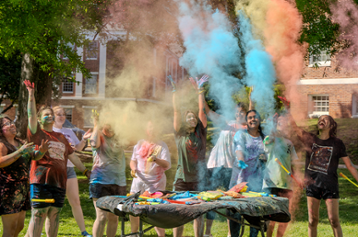Advisor: Dr. Barry Rhoades
brhoades@wesleyancollege.edu
Allied health encompasses a broad group of health professionals who use scientific principles and evidence-based practice for the diagnosis, evaluation, and treatment of acute and chronic diseases, who promote disease prevention and wellness for optimum health, and who support other health care providers in delivering care. The scope of allied health practice extends to the individual, the family, the community, and to public education. Many allied health professions specialize in the promotion of optimum health and the improvement of health-related quality of life. In addition, heath care administration and health systems management are important components of allied health. Professions that are often listed as “allied health” include many of the well-known non-nurse, non-physician health care providers including audiologists and speech language pathologists, physical therapists, occupational therapists and respiratory therapists, diagnostic medical personnel including medical technologists, imaging specialists, nutritionists, dietitians, and physician assistants.
Allied health professions fall into three broad categories: technicians (assistants), therapists and technologists. Technicians are trained to perform procedures, and their education lasts less than two years. They are required to work under the supervision of technologists or therapists. Cardiovascular technicians, ophthalmic medical technicians, and medical assistants are examples of careers in this category. The educational process for therapists (including physician assistants and physical therapists) or technologists (including audiologists and athletic trainers) is more intensive and includes acquiring procedural skills, learning to evaluate patients, diagnose conditions, develop treatment plans, and understand the rationale behind various treatments in order to judge their appropriateness and potential side effects. Generally, therapists/technologists require an undergraduate degree and additional post-baccalaureate and/or graduate education.
Because of the diversity of allied health professions, it is best to consult the specific requirements at the graduate school of your choice. Consult with Wesleyan's Pre-Allied Health Profession Advisor, Dr. Barry Rhoades, to verify the coursework plan that is right for you. A diversity of undergraduate majors are possible for students choosing to pursue a pre-allied health concentration; common courses for a variety of professions include the following:
Course and Semester Hours
biochemistry, child psychology, cognitive psychology, data analysis management, microbiology, molecular cell biology, organic chemistry, physics, principles of neuroscience, psychology, abnormal psychology.
| YEAR ONE Fall Semester | YEAR ONE Spring Semester |
|---|---|
| BIO 110 | BIO 112 |
| Gen Ed Electives / PSY 101 | Gen Ed Electives |
| WISE 101 | MAT 220 |
| MAT 160 | Foreign Language |
| Foreign Language | - |
| YEAR TWO Fall Semester | YEAR TWO Spring Semester |
| CHM 101 | CHM 102 |
| BIO 203 | Gen Ed Electives/ENG 221 |
| GEN ED ELECTIVES/ENG 111 | Major Coursework |
| Major Coursework | PHI 223 |
| YEAR THREE Fall Semester | YEAR THREE Spring Semester |
| BIO 210 | BIO 211 |
| PDE | Major Coursework/Gen Ed |
| Major Coursework/Gen Ed | Electives/PDE |
| Electives | HCA 308 |
| YEAR FOUR Fall Semester | YEAR FOUR Spring Semester |
| Major Coursework | Major Coursework |
| Gen Ed Electives | Gen Ed Electives |
* Consult the requirements for courses specific to your desired allied health profession
The resources below may be helpful for students preparing for a career in health care. The Center for Career Development can help students with deciding which path fits them, as well as with strategic career planning, creating resumes/CVs, writing personal statements, and more.
This site is designed to help students begin their journey towards a career in the health professions. It provides exploration tools and career information on fields including dentistry, medicine, allied health, veterinary medicine, and more. Website
Professional associations in any given field often have many resources for students considering that field, including scholarships, networking, career advice, and testing information. To find relevant professional associations, simply search “professional association + [job title/industry].”
This organization’s mission is to advance the allied health professions. Website
Depending on your field, it is likely important to gain relevant work, volunteer, or observation experience. The Center for Career Development can help you prepare a resume and practice your professional introduction as you get ready to contact organizations about shadowing, volunteer, or internship opportunities.
A free summer enrichment program focused on improving access to information and resources for college students interested in the health professions. SHPEP is exclusively for freshman and sophomore college students. Applications are usually due in early February. Website
This organization’s mission is to increase diversity in STEM fields by connecting underrepresented students with opportunities. It provides a list of clinical and research opportunities, links to enrichment programs, and more. Website

Wesleyan College is privileged to steward many arts and cultural events and share them with the community. Most are free and open to the public. Wesleyan art galleries are open M-F 1-5PM and on Wesleyan Market Saturdays from 10AM-2PM.
Event listing
Wesleyan College is home to five NCAA Division III sports: soccer, basketball, volleyball, tennis, and softball. In addition, we offer an award-winning Intercollegiate Horse Show Association (IHSA) Equestrian program.
View More
Tour our beautiful 200-acre campus featuring Georgian architecture, lush green spaces, recreational facilities, residence halls, and worship center.
Vist Wesleyan Virtually